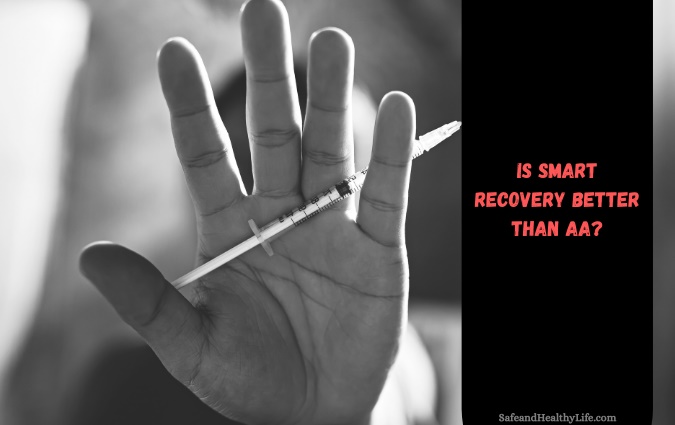
SMART Recovery is a controversial addiction recovery non-profit that has, over the years, been largely positioned as an alternative to the vastly more well-known Alcoholics Anonymous.
Since it started gaining prominence in the 1990s, SMART Recovery’s addiction treatment model has become the go-to for a growing number of non-religious Americans.
The treatment model offered by Alcoholics Anonymous and its offshoot Narcotics Anonymous, while still largely dominant throughout the US, has long been widely criticized for having a spiritual or religious approach that requires belief in a “Higher Power”.
While it’s undeniable that AA and NA have had success with this approach in the past, American culture has moved to the point that even Americans who profess faith are more likely to go with an evidence-based approach.
As it is, the state of Massachusetts is currently among the least religious in the country, so it’s little surprise that non-spiritual, evidence-based alternatives to AA and NA would be in demand. The successes of SMART Recovery in Boston may soon be mirrored in other parts of America as the country becomes less and less religious.
Why did SMART Recovery take off in Boston?
Apart from being one of the least religious population centers in the US, Boston and the rest of Massachusetts are also ground zero for the current opioid epidemic, with the problem being about twice as bad here as it is in most of the country[1].
The area also has the highest underage drinking rates[2] in the country, as well as some of the worst for binge drinking[3], likely due to the high concentration of colleges and universities in the area.
This all contributed to an ample demand for evidence-based drug and alcohol treatment. As other parts of America become less religious, SMART Recovery programs are likely to find similar successes in those places as well.
How is SMART Recovery different from AA and NA?
SMART Recovery is more than just a non-religious alternative to AA and NA. Unlike the latter two, SMART Recovery is not primarily based on group sessions. Rather, it is aimed at recovering individuals who are more individualistic and consider themselves to be “self-starters”.
Total abstinence is also not necessarily a goal for SMART Recovery, where it is a central goal of AA and NA. Through SMART Recovery, individuals are free to select their own recovery goals, which could include a mere reduction in alcohol or drug consumption.
This very difference also makes it difficult to compare the two methodologies without first qualifying the specific goals made by an individual on SMART Recovery.
Another major difference is that SMART Recovery could be paired with other approaches, including, controversially, ones that are ideologically opposed to SMART Recovery.
Being on SMART Recovery doesn’t require individuals to quit AA or any other spiritual practice, as the main emphasis is to find whichever approach works.
Somewhat controversially, SMART Recovery veers away from the mainstream “addiction as a disease” theory. Rather, substance use disorders are seen as a type of deep learning or a complex behavioral issue that could not be sufficiently described as an illness. However, it doesn’t necessarily require a person to subscribe to this idea either, in contrast with AA and NA, which may accept non-religious individuals, but maintain a spiritual approach, regardless.
Is SMART Recovery better than AA?
Somewhat confusingly, it depends. A study published by the National Institutes of Health[4] shows that addiction treatment programs tend to be more successful when they’re ideologically aligned with their participants. In other words, people who share the more general American-style Christian values will likely be better served by AA and NA, while those who are non-religious or more likely to lean towards science, may find SMART Recovery to be a better choice.
Controversially, SMART Recovery was found worse than AA in one study when it came to bringing abstinence.
However, as mentioned earlier, SMART Recovery allows participants to set and adjust their goals. When specifically comparing SMART Recovery participants that aimed for abstinence from alcohol and AA participants, the results were very similar.
Conclusion
Whether or not SMART Recovery is better than AA seems to be largely dependent on context. It all depends on which program has values that you find yourself aligned with.
However, as American values continue to change, SMART Recovery and other models similar to it will likely be more appropriate for a growing number of people.
Fortunately, Americans have the luxury of choice when it comes to treatment approaches, and there are programs suited for every individual who needs help for a substance use disorder.
If you want to try out SMART Recovery, the nonprofit maintains a list of certified programs in New England, including several within Boston. If you need to try other approaches, program directories like Boston Drug Treatment Center can pull up a list of different faith-based and secular programs. Good luck, and be well!
About The Author:
Briana Jones is a digital marketer from the Philippines. She is passionate about living a healthy lifestyle and finding ways to achieve modern comforts in a sustainable manner. In her free time, you can find her prepping meals in the kitchen or exploring new running routes in the neighborhood. She also loves traveling.
Ref.
[1] https://www.bostonindicators.org/reports/report-website-pages/opioids-2018
[2] https://www.bostonherald.com/2019/03/23/mass-has-highest-rate-of-underage-drinking/
[3] https://whdh.com/news/local/report-massachusetts-has-one-of-the-biggest-drinking-problems-in-america




